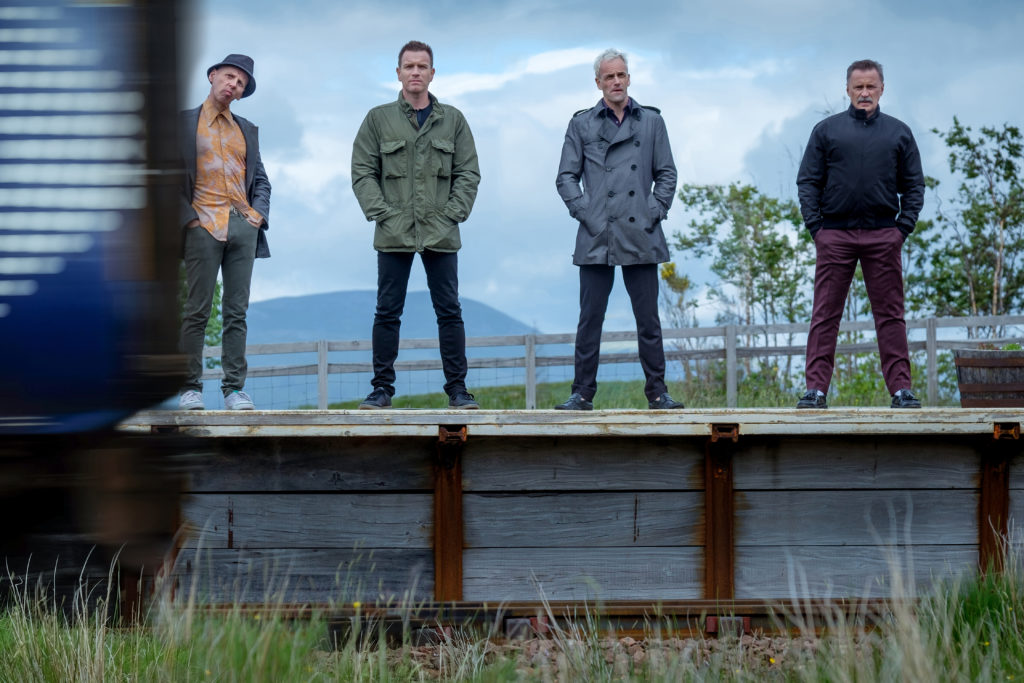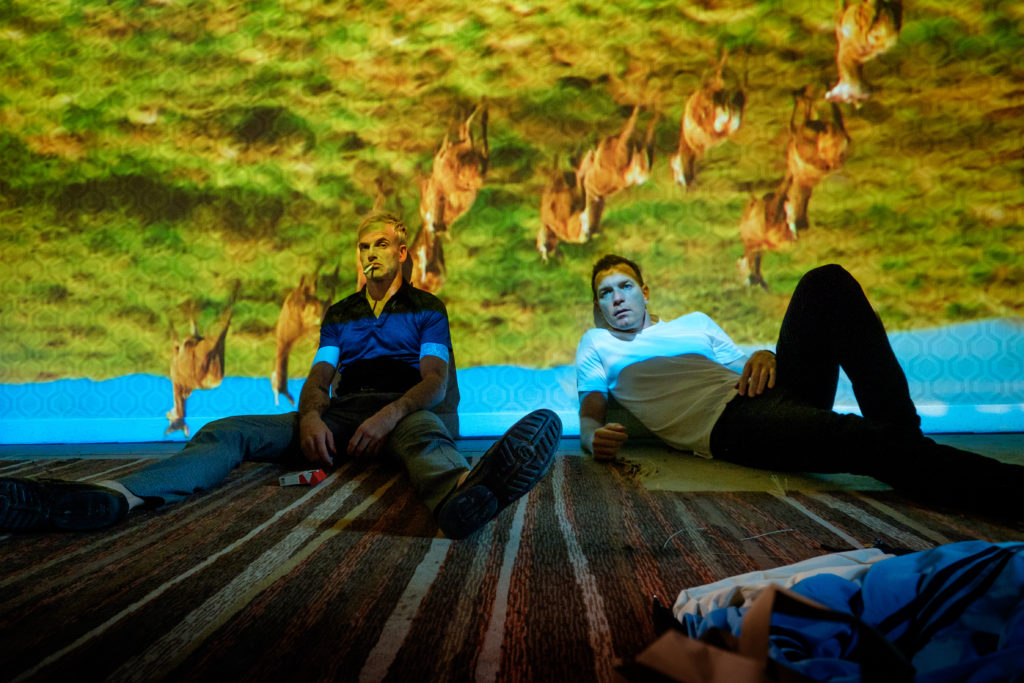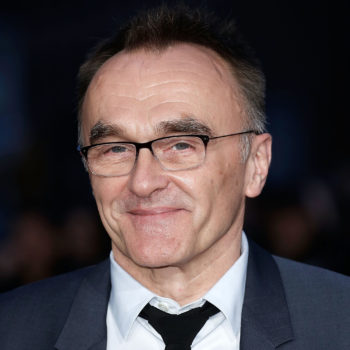Back in 1994, director Danny Boyle and screenwriter John Hodge made the hit indie thriller “Shallow Grave,” then followed it up with an adaptation of the Irvine Welsh novel “Trainspotting.” With it’s hurtling energy and Britpop soundtrack, it was an international hit, made a star out of Ewan McGregor, and became one of the cultural milestones of the ’90s.
Boyle went on to helm hits like “28 Days Later” and the Oscar-winning “Slumdog Millionaire” (and to direct the opening ceremonies of the London Olympics). But his latest project is a “Trainspotting” sequel. It finds the main characters struggling with middle age and their pasts as thieving heroin addicts.
The award-winning director talks with Rico about revisiting the characters after two decades, his title as an “Honorary Scot,” and the shadows he tries to capture in his work.
Interview highlights:
On whether he had any inkling the original “Trainspotting” would have such an impact on ’90s cinema
Danny Boyle: You can’t predict something’s gonna “touch the zeitgeist” or whatever it is they say — whatever the expression is. You’re gonna make it because you have an obsession with an idea.
And with that one, it was presenting these voices who are normally marginalized. Drug addicts from the fringe “sinker estates” around Edinburgh — they were on the outskirts of Edinburgh — were regarded as being, at best, victims. At worst, evil. And all stupid; to get involved with this drug and let their lives decay in the way they did.
But actually, the book celebrates their energy. Which is doomed in certain respects, but is also transcendent in other respects. And we wanted to capture that. And people loved it in a way that you could never have anticipated.
On when he first realized the original film was becoming a phenomenon
Danny Boyle: [The movie studio executives] were so nervous about it. ‘Cause there was quite a lot of flack attached to it early on. Those moral forces condemned it as being a film that was going to recommend drugs, and encourage drug use, etcetera etcetera. And they hadn’t seen the film, of course.
So I think they were very nervous releasing it. But I remember when it was released in a few screens in Scotland and in London… I remember this journalist. She was called Muriel Gray, a young Scottish journalist with a very forthright style. She wrote this argument for the film in the face of these people who were condemning it. And I remember thinking, “That’s interesting. She represents quite a lot of people — a lot of people will see the film in the way that we intended it, as she did.”
On whether anyone questioned if an Englishman like Boyle could helm a very Scottish film
Danny Boyle: I’m nervous about my “honorary Scot” status. And you have to be nervous and constantly aware that you are living on borrowed time in Scotland! They don’t suffer fools gladly. And they haven’t really got much time for the English, actually.
But we’d already made a film in Scotland, because the first film, “Shallow Grave,” was set there. So I think I’d sort of earned my spurs that I was kind of respectful to Scottish culture. Hey listen, I come from Manchester, which is an industrial city in the North of England. And the Scots’ tolerance evaporates as they head further South. So I was lucky I came from the North — it was bit easier for me, I think!
I mean the other person who was trusted, actually, was Jonny Lee Miller, who was the only non-Scot in the cast. And that’s an amazing achievement by him, to sit in amongst these amazing Scottish actors, you know? And he did it by method acting. So he would never drop the accent when he was having a drink at a bar or ordering food. He would always have the accent.
So much so that when Kelly Macdonald, who was a newcomer to movie making and to acting generally, when we had the wrap party when we finished the film, Jonny stepped out of his accent for the first time, but she was shocked! She didn’t know he was not [Scottish], and she was really quite upset. She thought she’d been lied to and she’d been deceived. And, of course, it was his method!
Rico Gagliano: “You cast an Englishman?!”
Danny Boyle: She didn’t really know anything about method acting. And he’s an Englishman. He’s from London.
On why he returned to these characters after 20 years
Danny Boyle: We tried for the wrong reasons, I think, 10 years ago. Irvine Welsh had published a novel sequel to “Trainspotting” called “Porno.” And we tried to adapt that, and we did adapt it. And it wasn’t very good.
And I think we kind of knew it wasn’t very good for the right reasons. Which is that if you’re gonna return to these characters who are held in real affection by people, you’ve got to have a really good reason to do so — as good a reason to do so as to make the first film when nobody wanted us to make it. And of course, we didn’t have a good reason 10 years ago. It was just a kind of rehash of the original.
Rico Gagliano: Just to have fun and because the book existed?
Danny Boyle: Yeah, put very simply. Yes, absolutely.
But after 20 years, it was very, very different. It’s not trying to just relive the glories of the first film. It’s only doing that because the characters are, like so many men, locked into their 20s as being their ideal time to be alive, and trying to replicate that constantly. Refusing to admit they’re living in the past, but actually behaving as though they are. Which gives the film a lot of its fun… but that is exhausting. They are 46 and in a lot of trouble, really, in terms of what are they going to do with their lives.

On how he relates to the characters in the film, despite having a successful career
Rico Gagliano: [The film] is about these aging men. They harbor a lot of sadness and resentment about the past. Feeling that they’ve misused their lives. But I have to say that actually just about everyone involved in these two films in real life seems to be the opposite kind of person. You and your screenwriter, the actors, all went on to hugely productive careers, seemingly adventurous lives. What do you relate to in this story?
Danny Boyle: The same existential horror lies in all our paths, really. [Laughs] I think it’s only superficial, the things you’re describing. They don’t really mask the true horrors that lie underneath. And I think that was the key for us all: That no matter what you think you’ve achieved, there are absences and losses and disappointments that are part of you. And part of growing is obviously learning to acknowledge them and, in some cases, to atone for them.
Rico Gagliano: If I may, though, is there something in your past that you related to in a similar way? Something that you regretted, or maybe a project you didn’t get done?
Danny Boyle: Not projects, no. That’s kind of the problem, is you end up doing your projects, and it’s the other things that suffer, really.
So I’ve got three kids, who are great. They’re all grown up now. How much of a part I played in their upbringing? You know, I did a lot of projects. And I missed my mother’s death ’cause I was working.
And it was when John Hodge — the screenwriter — and I were prepared to admit to stuff like that, that we began to come up with something that felt like it gave us a real belief and vision in a film that wouldn’t just be a rehash of the original. That would put to use these characters for something that had some purpose.

On how the original film represents a significant time in the lives of its fans
Danny Boyle: It is interesting that people who see the film, they are part of the film and its conversation because the 20 years… what that represents, that 20 years, is significant for everyone. People talk to you about when they saw the first movie and who they were dating and–
Rico Gagliano: Absolutely. When I heard about the 20th anniversary re-release of “Trainspotting,” I remember putting on social media: “These four words made me feel older than any other four words: Trainspotting Twentieth Anniversary Release.”
Danny Boyle: It’s crazy, isn’t it? It’s crazy! When we made the film, there was no such thing as the Internet. You go, “What?!” It’s nuts, but there wasn’t!
And it returns actors who you’ve… I suppose if you loved the first film, you’ve frozen in time. You have an image of Renton, say, coming out of that toilet. You lock in. It’s like a picture from your family album of your favorite movies. It’s like, “Bam! I know that picture! I love that bit! I’ve talked to mates about it.” And as a filmmaker, you have the power — and it’s a big responsibility, of course — to unlock that time and say, “No, this is what it looks like now. It’s not another part. It’s the same guy playing the same character.”
On something we don’t know from when he directed the opening ceremony of the 2012 Olympics in London
Danny Boyle: The Olympics thing was… it was extraordinary, ’cause I’d never really done a live event on that scale. And there were a couple of dress rehearsals when they had 80,000 people in the stadium. And I’d walk round and there’d be ambulance crews underneath the stadium.
And I went and talked to them and they said — in the spirit of “Trainspotting 2,” I’ll mention it — they said, “Yeah, statistically, there’ll be a heart attack tonight. So while your show is going on, someone will have a heart attack.” And I was like, “What?!”
Rico Gagliano: In the stadium?!
Danny Boyle: In the stadium. They said, “It might not happen, but statistically that’s why we’re here.”
So that was a weird thing. And it’s really important to see shadow, especially an event like that which is full of celebration. It was a big triumphant evening for everybody, and everybody was like, “Ra ra ra!” And it’s good to always remember that there’s a shadow there, and people have to look after the shadow, you know?


